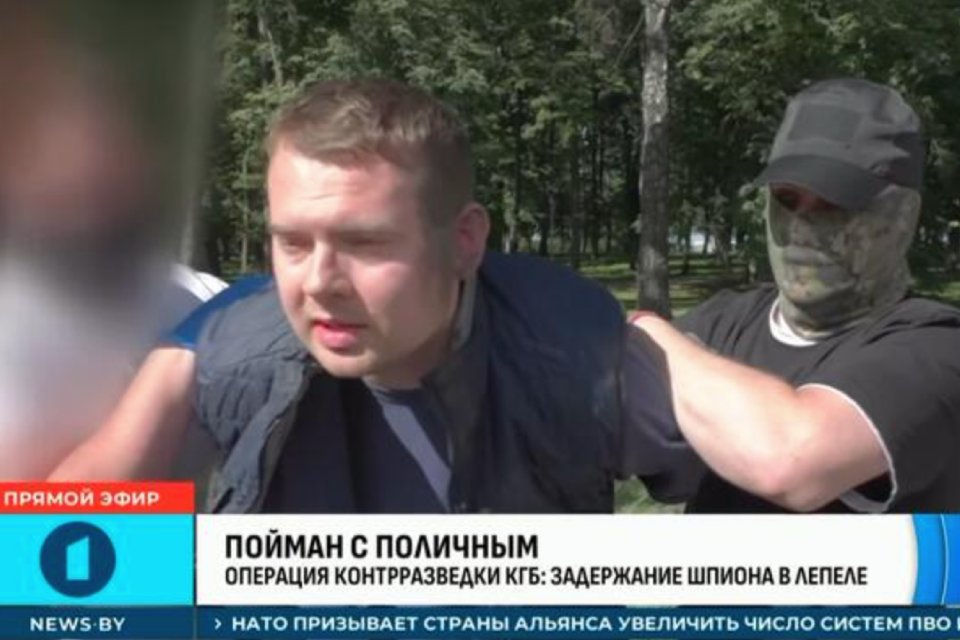Belarusian state media reported this week the arrest of a 27-year-old Polish citizen, identified as Grzegorz Havel, in the town of Lepel, Vitebsk Region. The Independent Belarusian portal Zerkalo confirmed the detention, which was staged and broadcast on First Information State TV.
According to official Minsk claims, Havel was caught by officers of the Belarusian State Security Committee (KGB) while allegedly collecting classified documents tied to the Zapad-2025 joint military exercises conducted by Russia and Belarus.
State television broadcasted the arrest footage, showcasing Havel inside a vehicle that allegedly found secret materials minutes before his detention.
The broadcast included an exchange where a KGB officer questioned Havel in broken Polish, asking what his tasks were. In the edited clip, Havel appeared to reply that he had been instructed to collect information on the Zapad exercises.
Belarusian authorities also claimed to have seized “many items indicating his religious affiliation,” an apparent reference to his role as a Catholic monk.
Allegations of Espionage
Belarusian officials alleged that Havel had approached a Belarusian citizen through social networks, offering cooperation “in the interests of the Polish special services” in exchange for money. The supposed mission was to gather sensitive military data on Belarus.
The Zapad-2025 drills, scheduled for September 12–16, involve both Belarusian and Russian forces and are viewed by NATO states as strategically significant, given their scale and proximity to the alliance’s eastern borders.
Minsk portrays the discovery of espionage attempts as a convenient narrative of external threats against its sovereignty and its military partnership with Russia.
Religious Background of the Detainee
Investigations by Zerkalo found that Havel is not a typical intelligence operative but a deeply religious Catholic, affiliated with the Carmelite order. He defended an academic dissertation on religious topics and lived in Krakow, Poland.
His arrest, therefore, has drawn particular attention, as the optics of detaining a monk on espionage charges have fueled accusations that Belarus is staging provocations to discredit Poland.
In Warsaw, officials were quick to note this aspect. Commentators pointed to the inconsistency of Belarusian claims, stressing that Polish intelligence services would never task a member of a monastic order with clandestine operations.
Polish Government Response
The arrest has escalated into a diplomatic incident between Warsaw and Minsk.
Polish Foreign Minister Radosław Sikorski confirmed on Thursday evening that his government had received preliminary information about the detention. He reminded the public of the Belarusian regime’s record, stressing:
“We know what kind of regime this is and what to expect from it. There are already Polish citizens in Lukashenko’s prisons, including journalist Andrzej Poczobut. We are already holding internal government consultations on how to respond to this case. I am convinced that this question will not remain unanswered.”
Jacek Dobrzyński, spokesman for Poland’s special services coordinator, dismissed the Belarusian version of events as fabrication. He stated clearly that “Polish special services do not use monks to collect information about military exercises,” describing the detention as another provocation orchestrated by the Lukashenko regime.
On Friday, Polish Foreign Ministry spokesman Paweł Wroński expanded on Warsaw’s position, issuing a strong travel warning:
“The Foreign Ministry categorically does not recommend traveling to the territory of Belarus. Polish citizens may encounter events there that will not be favorable for them. This nation is not a democratic country; it is also not a country friendly to the Republic of Poland.”
He added that Poland would provide support to Havel and viewed the detention as a deliberate attempt to destabilize Poland and influence perceptions in Ukraine.
Belarusian Reaction
The Belarusian Foreign Ministry, for its part, summoned the Polish chargé d’affaires ad interim, Krzysztof Ożanna, to deliver a formal protest. In a strongly worded statement, Minsk accused Warsaw of violating the principles of good-neighborly relations:
“The Polish diplomat was strongly protested and handed a corresponding note in connection with the act of espionage committed by a citizen of the Republic of Poland, Grzegorz Havel, on the territory of the Republic of Belarus.”
The statement also warned Poland against actions that could harm Belarusian national security and urged Warsaw to “return to the path of civilized dialogue.” Officials signaled that a legal evaluation of Havel’s actions was already underway, suggesting that criminal proceedings could follow.
A Provocation in the Shadow of Zapad-2025
For many observers, the case fits into a broader pattern. Belarus, heavily aligned with Russia since the full-scale invasion of Ukraine in 2022, has often used politically charged arrests to escalate tensions with its western neighbors.
Detaining a monk accused of espionage, just days before Zapad-2025 begins, carries symbolic weight: it projects vigilance against foreign interference while sending a message to Poland and NATO.
At the same time, Warsaw interprets the event as a staged provocation. Polish officials see it as an attempt by Minsk not only to embarrass Poland but also to amplify narratives of external hostility for domestic audiences in Belarus and Russia.
Key Implications
The detention of Grzegorz Havel raises pressing questions for regional stability and bilateral relations:
- It underscores the fragility of Poland–Belarus relations, already strained by the imprisonment of Polish activists and journalists in Belarus.
- It highlights how military exercises like Zapad-2025 serve as flashpoints for geopolitical confrontation, with Moscow and Minsk framing them as defensive while NATO states remain wary.
- It risks sparking further retaliatory measures from Poland, which has pledged not to let the case go unanswered.
As Zapad-2025 approaches, the arrest of a Polish monk may be remembered less for its espionage allegations and more as a symbol of the political theater surrounding Belarus’s role in the region as Russia’s ally in the context of Moscow’s ongoing war of aggression against Ukraine.

